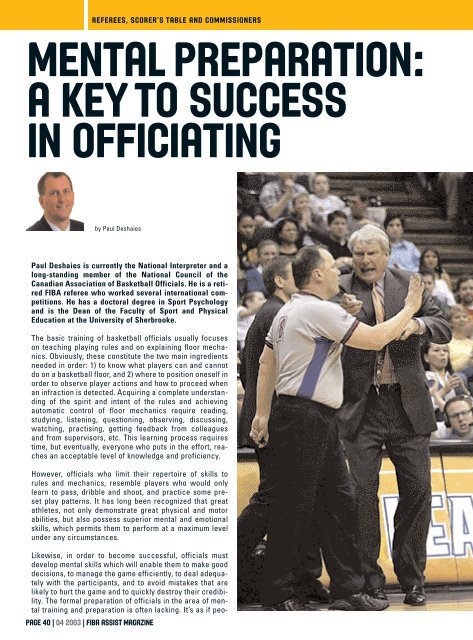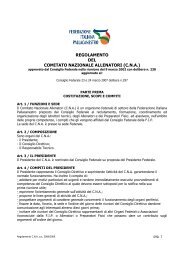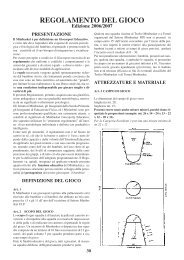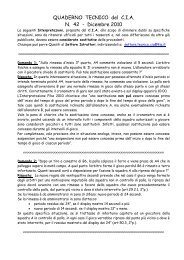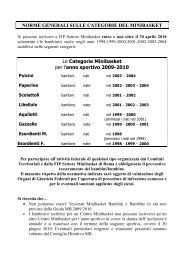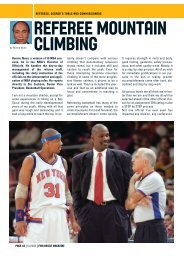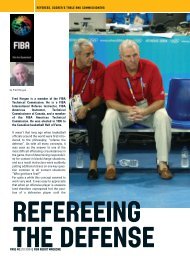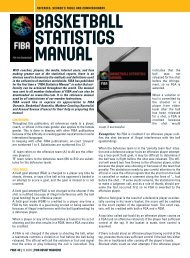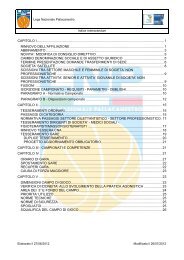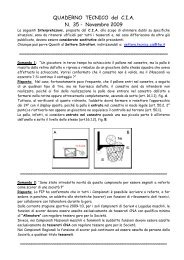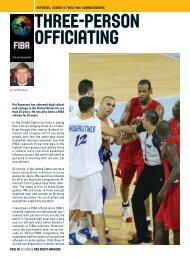mental preparation: a key to success in officiating - Fiba
mental preparation: a key to success in officiating - Fiba
mental preparation: a key to success in officiating - Fiba
You also want an ePaper? Increase the reach of your titles
YUMPU automatically turns print PDFs into web optimized ePapers that Google loves.
REFEREES, SCORER’S TABLE AND COMMISSIONERS<br />
MENTAL PREPARATION:<br />
A KEY TO SUCCESS<br />
IN OFFICIATING<br />
by Paul Deshaies<br />
Paul Deshaies is currently the National Interpreter and a<br />
long-stand<strong>in</strong>g member of the National Council of the<br />
Canadian Association of Basketball Officials. He is a retired<br />
FIBA referee who worked several <strong>in</strong>ternational competitions.<br />
He has a doc<strong>to</strong>ral degree <strong>in</strong> Sport Psychology<br />
and is the Dean of the Faculty of Sport and Physical<br />
Education at the University of Sherbrooke.<br />
The basic tra<strong>in</strong><strong>in</strong>g of basketball officials usually focuses<br />
on teach<strong>in</strong>g play<strong>in</strong>g rules and on expla<strong>in</strong><strong>in</strong>g floor mechanics.<br />
Obviously, these constitute the two ma<strong>in</strong> <strong>in</strong>gredients<br />
needed <strong>in</strong> order: 1) <strong>to</strong> know what players can and cannot<br />
do on a basketball floor, and 2) where <strong>to</strong> position oneself <strong>in</strong><br />
order <strong>to</strong> observe player actions and how <strong>to</strong> proceed when<br />
an <strong>in</strong>fraction is detected. Acquir<strong>in</strong>g a complete understand<strong>in</strong>g<br />
of the spirit and <strong>in</strong>tent of the rules and achiev<strong>in</strong>g<br />
au<strong>to</strong>matic control of floor mechanics require read<strong>in</strong>g,<br />
study<strong>in</strong>g, listen<strong>in</strong>g, question<strong>in</strong>g, observ<strong>in</strong>g, discuss<strong>in</strong>g,<br />
watch<strong>in</strong>g, practis<strong>in</strong>g, gett<strong>in</strong>g feedback from colleagues<br />
and from supervisors, etc. This learn<strong>in</strong>g process requires<br />
time, but eventually, everyone who puts <strong>in</strong> the effort, reaches<br />
an acceptable level of knowledge and proficiency.<br />
However, officials who limit their reper<strong>to</strong>ire of skills <strong>to</strong><br />
rules and mechanics, resemble players who would only<br />
learn <strong>to</strong> pass, dribble and shoot, and practice some preset<br />
play patterns. It has long been recognized that great<br />
athletes, not only demonstrate great physical and mo<strong>to</strong>r<br />
abilities, but also possess superior <strong>mental</strong> and emotional<br />
skills, which permits them <strong>to</strong> perform at a maximum level<br />
under any circumstances.<br />
Likewise, <strong>in</strong> order <strong>to</strong> become <strong>success</strong>ful, officials must<br />
develop <strong>mental</strong> skills which will enable them <strong>to</strong> make good<br />
decisions, <strong>to</strong> manage the game efficiently, <strong>to</strong> deal adequately<br />
with the participants, and <strong>to</strong> avoid mistakes that are<br />
likely <strong>to</strong> hurt the game and <strong>to</strong> quickly destroy their credibility.<br />
The formal <strong>preparation</strong> of officials <strong>in</strong> the area of <strong>mental</strong><br />
tra<strong>in</strong><strong>in</strong>g and <strong>preparation</strong> is often lack<strong>in</strong>g. It’s as if peo-<br />
PAGE 40 | 04 2003 | FIBA ASSIST MAGAZINE
ple were expected <strong>to</strong> already possess those skills before<br />
decid<strong>in</strong>g <strong>to</strong> become officials. Unfortunately, more often<br />
than not, it is not the case at all. Mental skills are not <strong>in</strong>nate.<br />
They can be learned and must be rehearsed.<br />
A book, entitled “Psychology of Officiat<strong>in</strong>g”, written by<br />
Bob We<strong>in</strong>berg and Peggy Richardson, both respected<br />
sport psychologists and experienced sport officials,<br />
offers, <strong>in</strong> my view, the most <strong>in</strong>terest<strong>in</strong>g and comprehensive<br />
approach <strong>to</strong> the various psychological aspects of sport<br />
officiat<strong>in</strong>g. Many of the comments and suggestions offered<br />
<strong>in</strong> this article were <strong>in</strong>spired by their outstand<strong>in</strong>g work.<br />
Concentration constitutes the funda<strong>mental</strong> basis for<br />
mak<strong>in</strong>g proper decisions <strong>in</strong> a fast-mov<strong>in</strong>g game such as<br />
basketball. The official must observe the action, analyse<br />
the events, compare the results <strong>to</strong> the prescriptions set by<br />
the play<strong>in</strong>g rules, determ<strong>in</strong>e if an <strong>in</strong>fraction <strong>in</strong>deed occurred,<br />
and, as the case may be, decide <strong>to</strong> blow the whistle or<br />
not. All of that <strong>in</strong> the bl<strong>in</strong>k of an eye! Proper concentration<br />
also <strong>in</strong>sures that the game is managed efficiently and that<br />
mistakes are avoided.<br />
Concentration may be def<strong>in</strong>ed as “the ability <strong>to</strong> focus on<br />
relevant cues <strong>in</strong> the environment and <strong>to</strong> ma<strong>in</strong>ta<strong>in</strong> that<br />
focus over the course of the contest.”. Concentration is a<br />
skill and an ongo<strong>in</strong>g process. In the game of basketball,<br />
cues are numerous and ever chang<strong>in</strong>g. The action determ<strong>in</strong>es<br />
what is relevant and what is not. When play is <strong>in</strong><br />
progress, each official has primary responsibility for specific<br />
areas on the floor and for the players <strong>in</strong> those areas.<br />
They should pay attention <strong>to</strong> what players are do<strong>in</strong>g and<br />
try <strong>to</strong> anticipate future actions. Irrelevant cues compete<br />
for that attention. They may <strong>in</strong>clude noise from an<br />
unfriendly crowd, a compla<strong>in</strong><strong>in</strong>g athlete or coach, thoughts<br />
about the outcome of the game, a previously missed<br />
call, or the fear of mak<strong>in</strong>g a mistake. It is important <strong>to</strong> keep<br />
one’s m<strong>in</strong>d free of irrelevant thoughts.<br />
Concentration is related <strong>to</strong> motivation. Boredom is a<br />
potent enemy of concentration. It’s hard <strong>to</strong> focus on<br />
someth<strong>in</strong>g you really don’t care about, such as, for <strong>in</strong>stance,<br />
the first quarter of a U-12 exhibition game where the<br />
score is already 18-2. However, if you are a professional,<br />
which you should be s<strong>in</strong>ce you are gett<strong>in</strong>g paid <strong>to</strong> do a job,<br />
you owe it <strong>to</strong> the players and <strong>to</strong> yourself <strong>to</strong> be at your best<br />
at all times when you officiate or you may just as well stay<br />
home. Whenever the contest itself is not very motivat<strong>in</strong>g,<br />
challenge yourself <strong>in</strong> order <strong>to</strong> <strong>in</strong>crease your <strong>in</strong>terest. S<strong>in</strong>ce<br />
you are there, try and make it as much fun as possible.<br />
Ignore the lack of quality of play and work extra hard <strong>to</strong><br />
see everyth<strong>in</strong>g and not <strong>to</strong> miss a s<strong>in</strong>gle call. Try for a perfect<br />
game. It really doesn’t matter for the outcome, but<br />
make it important <strong>to</strong> you personally.<br />
At the other end of the spectrum <strong>in</strong> terms of the <strong>in</strong>terest<br />
generated by the game itself, there is the championship<br />
game. That big game you’ve been hop<strong>in</strong>g for. It’s easy <strong>to</strong> get<br />
up for that one. No need here <strong>to</strong> look for extra motivation.<br />
However, your concentration may face another powerful<br />
foe <strong>in</strong> that situation: anxiety stemm<strong>in</strong>g from the fear of<br />
mak<strong>in</strong>g mistakes, of ru<strong>in</strong><strong>in</strong>g the game, and of look<strong>in</strong>g bad.<br />
When officiat<strong>in</strong>g, you need an external mode of attention.<br />
You need <strong>to</strong> process various visual <strong>in</strong>formations from the<br />
environment. A high level of anxiety narrows your attention<br />
and usually directs it <strong>in</strong>wardly. When you are <strong>to</strong>o anxious,<br />
you are primarily pay<strong>in</strong>g attention <strong>to</strong> yourself and <strong>to</strong> your<br />
fears or worries. No one is immune <strong>to</strong> some degree of<br />
anxiety <strong>in</strong> important situations. In fact, a certa<strong>in</strong> level of<br />
stress is healthy because it keeps you activated. The ma<strong>in</strong><br />
th<strong>in</strong>g is <strong>to</strong> recognise when anxiety is reach<strong>in</strong>g an undesired<br />
level and when your concentration is affected. Be<br />
aware of your thoughts. If they are not focused on the<br />
action around you, there’s someth<strong>in</strong>g wrong and you need<br />
<strong>to</strong> make corrections. This requires practice. A certa<strong>in</strong><br />
degree of mastery of relaxation techniques is manda<strong>to</strong>ry.<br />
Deep breath<strong>in</strong>g, isolated muscular contraction followed by<br />
FIBA ASSIST MAGAZINE | 04 2003 | PAGE 41
REFEREES, SCORER’S TABLE AND COMMISSIONERS<br />
<strong>to</strong>tal relaxation,<br />
changes from<br />
negative <strong>to</strong> positive<br />
thoughts are<br />
among means that<br />
can be used <strong>to</strong><br />
decrease anxiety<br />
and enhance proper<br />
focus. It may<br />
also be helpful <strong>to</strong><br />
use cue words<br />
such as “Relax” or<br />
“Calm down”,<br />
“Breathe”, or<br />
“Focus”. Despite<br />
the fact that, <strong>to</strong><br />
some people, a<br />
basketball game<br />
seems <strong>to</strong> be the<br />
end of the world,<br />
remember it’s just<br />
a game. Keep that<br />
<strong>in</strong> perspective.<br />
Each <strong>in</strong>dividual<br />
must develop the<br />
techniques that<br />
work best for<br />
him/her <strong>in</strong> controll<strong>in</strong>g<br />
anxiety.<br />
As mentioned<br />
above, the ability<br />
<strong>to</strong> concentrate can be improved as long as you are will<strong>in</strong>g<br />
<strong>to</strong> work at it. The off-season is the best time <strong>to</strong> implement<br />
a program of <strong>mental</strong> tra<strong>in</strong><strong>in</strong>g. The first step is <strong>to</strong> identify<br />
how well you concentrate and whether this is an area you<br />
can improve.<br />
We<strong>in</strong>berg and Richardson designed a self-help test on<br />
concentration skills. The test is presented at the end of<br />
this article. After you have identified your level of concentration<br />
skills, you may wish <strong>to</strong> work on exercises <strong>to</strong> improve<br />
them. Here are brief descriptions of a few th<strong>in</strong>gs you<br />
can do <strong>in</strong> that area.<br />
LEARNING HOW TO SHIFT ATTENTION<br />
First, sit or lie down <strong>in</strong> a comfortable position. Take a few<br />
deep breaths and relax. Now, pay attention <strong>to</strong> what you<br />
hear. Identify each separate sound. Now, listen <strong>to</strong> all the<br />
sounds at once without try<strong>in</strong>g <strong>to</strong> label any of them.<br />
Now, pay attention <strong>to</strong> your bodily feel<strong>in</strong>gs. Th<strong>in</strong>k of the<br />
chair support<strong>in</strong>g your body, the rhythm of your breath<strong>in</strong>g,<br />
the level of relaxation <strong>in</strong> each part of your body. L<strong>in</strong>ger a<br />
little bit on each of these feel<strong>in</strong>gs.<br />
Then, try <strong>to</strong> experience all of them at once without nam<strong>in</strong>g<br />
any one <strong>in</strong> particular.<br />
Then, th<strong>in</strong>k of your thoughts and emotions. Lets them just<br />
arise. Don’t force yourself <strong>to</strong> th<strong>in</strong>k about anyth<strong>in</strong>g <strong>in</strong> particular.<br />
Let the thoughts flow.<br />
Now, try <strong>to</strong> experience each feel<strong>in</strong>g or thought one at a<br />
time. Then let go all of these thoughts and relax.<br />
F<strong>in</strong>ally, place some object directly <strong>in</strong> front of you. While<br />
look<strong>in</strong>g straight ahead, see as much of the room as your<br />
peripheral vision will allow, without fixat<strong>in</strong>g anyth<strong>in</strong>g <strong>in</strong><br />
particular.<br />
PAGE 42 | 04 2003 | FIBA ASSIST MAGAZINE<br />
Then, focus on the object <strong>in</strong> front of you until it is the only<br />
th<strong>in</strong>g you see. Ma<strong>in</strong>ta<strong>in</strong> your focus for a while and slowly<br />
expand it back <strong>to</strong> the entire room. Make it work as if your<br />
vision was a zoom<strong>in</strong>g lens. Zoom <strong>in</strong> and out slowly.<br />
LEARNING HOW TO MAINTAIN FOCUS<br />
F<strong>in</strong>d a quiet place with no distraction. Choose an object <strong>to</strong><br />
focus on. Hold the object <strong>in</strong> your hands. Exam<strong>in</strong>e it <strong>in</strong> great<br />
details, its texture, its colours, and its weight. If your thoughts<br />
move away from the object, br<strong>in</strong>g them back <strong>to</strong> it.<br />
Record how long you can stay focused entirely on the<br />
object.<br />
Once you are able <strong>to</strong> stay focused cont<strong>in</strong>uously for 5 m<strong>in</strong>utes,<br />
try it aga<strong>in</strong> <strong>in</strong> the presence of some distraction (music,<br />
TV). See how completely and how long you can stay focused<br />
despite distractions.<br />
PRACTICING GAME CONCENTRATION<br />
Imagery or visualisation is a technique used by many athletes<br />
<strong>to</strong> improve their confidence and their performance. It<br />
can be extremely beneficial <strong>to</strong> officials as well. An imagery<br />
session should not last more than 10 <strong>to</strong> 15 m<strong>in</strong>utes.<br />
First, relax and empty your head. Then create images <strong>in</strong><br />
your m<strong>in</strong>d: images of yourself gett<strong>in</strong>g on<strong>to</strong> the floor, cover<strong>in</strong>g<br />
a particular sequence of play, be<strong>in</strong>g <strong>in</strong> a great position<br />
and mak<strong>in</strong>g a good call, deal<strong>in</strong>g with crowd noise or with<br />
a compla<strong>in</strong><strong>in</strong>g player or coach. When you create these<br />
images, get all your senses <strong>in</strong>volved, vision, hear<strong>in</strong>g,<br />
smell, and <strong>to</strong>uch.<br />
Make the vision as completely real as possible. See yourself<br />
handl<strong>in</strong>g everyth<strong>in</strong>g perfectly <strong>in</strong> each of the situations<br />
you create.
ON-SITE PREPARATION<br />
There are also steps you can take <strong>to</strong> enhance your concentration<br />
immediately before your game.<br />
Start with a good pre-game conference with your partner(s).<br />
While you may not discuss anyth<strong>in</strong>g that you don’t<br />
already know, the pre-game is a great opportunity <strong>to</strong> get<br />
your m<strong>in</strong>d focused on the task <strong>to</strong> be accomplished.<br />
Br<strong>in</strong>g your level of activation <strong>to</strong> the proper level. You cannot<br />
go on<strong>to</strong> the floor apathetically or overly excited.<br />
Dur<strong>in</strong>g the game, use cue words such as “Move”, “Relax”,<br />
“Spot the defence”, and “F<strong>in</strong>d the spaces”.<br />
When a foul is called, spot the shooter even if you know<br />
that there won’t be free throws. Repeat his/her number<br />
five times <strong>in</strong> your head.<br />
You won’t be taken by surprise when the time comes <strong>to</strong><br />
put the right shooter at the l<strong>in</strong>e.<br />
At the beg<strong>in</strong>n<strong>in</strong>g of a time out, as you are mov<strong>in</strong>g <strong>to</strong> your<br />
spot <strong>to</strong> wait for play <strong>to</strong> resume, rehearse what’s com<strong>in</strong>g<br />
next <strong>in</strong> your head: “Red ball on the sidel<strong>in</strong>e”, or “2 free<br />
throws for 12 white”.<br />
Use the time out <strong>to</strong> take a couple of deep breaths, relax<br />
and check your focus. Deal with the present. If you make a<br />
bad call, accept it and go on.<br />
Don’t dwell on self-criticism. Don’t worry about what may<br />
happen, be ready <strong>to</strong> handle everyth<strong>in</strong>g calmly. Control your<br />
emotions.<br />
Recognise that a coach, player or even a specta<strong>to</strong>r is<br />
mak<strong>in</strong>g you angry, and calm down. Don’t rema<strong>in</strong> <strong>in</strong> a state<br />
of m<strong>in</strong>d, which may impair or bias your judgement. In order<br />
words, only concentrate on the <strong>in</strong>formation that will help<br />
you make the best possible decisions.<br />
To be <strong>success</strong>ful, an official has <strong>to</strong> control everyth<strong>in</strong>g that<br />
can be controlled, especially him/herself.<br />
Perfect knowledge of the rules and proper mechanics,<br />
especially <strong>in</strong> cover<strong>in</strong>g the floor and be<strong>in</strong>g <strong>in</strong> a position<br />
where all the action can be seen, should become so<br />
engra<strong>in</strong>ed that only m<strong>in</strong>imal voluntary or conscious attention<br />
is required. They ought <strong>to</strong> be au<strong>to</strong>matic.<br />
They no longer require concentration. When perfectly<br />
learned, they become a source of self-confidence. Then<br />
the official can focus on evaluat<strong>in</strong>g the players’ actions<br />
and decide <strong>to</strong> call or <strong>to</strong> let go.<br />
Concentration is a great asset. It is not an <strong>in</strong>nate skill.<br />
It requires work. Invest<strong>in</strong>g a few m<strong>in</strong>utes on a regular<br />
basis <strong>in</strong> develop<strong>in</strong>g your <strong>mental</strong> skills is a must, if you aspire<br />
at becom<strong>in</strong>g a <strong>to</strong>p official.<br />
SELF-HELP TEST - CONCENTRATION SKILLS<br />
The follow<strong>in</strong>g questions refer <strong>to</strong> your ability <strong>to</strong> concentrate<br />
while officiat<strong>in</strong>g.<br />
There are no right or wrong answers. Just write the number<br />
that best describes you for each statement.<br />
1 = Almost never 2 = Rarely 3 = Sometimes<br />
4 = Frequently 5 = Almost always<br />
▼<br />
▼<br />
1. If I blow a call, I have difficulty putt<strong>in</strong>g it out of<br />
my m<strong>in</strong>d.<br />
2. When I officiate, I am good at quickly analyz<strong>in</strong>g<br />
what’s happen<strong>in</strong>g <strong>in</strong> the game.<br />
▼<br />
▼<br />
▼<br />
▼<br />
▼<br />
▼<br />
▼<br />
▼<br />
▼<br />
▼<br />
▼<br />
▼<br />
▼<br />
3.It is easy for me <strong>to</strong> keep irrelevant thoughts from<br />
enter<strong>in</strong>g my m<strong>in</strong>d when I am officiat<strong>in</strong>g.<br />
4. I am good at block<strong>in</strong>g out the noise<br />
of specta<strong>to</strong>rs and focus<strong>in</strong>g on the action.<br />
5. While officiat<strong>in</strong>g, I get confused when many<br />
th<strong>in</strong>gs happen quickly.<br />
6. When I officiate, I f<strong>in</strong>d myself distracted by my<br />
own thoughts.<br />
7. I am good at analys<strong>in</strong>g what I need <strong>to</strong> focus on<br />
dur<strong>in</strong>g an event.<br />
8. When officiat<strong>in</strong>g, I focus on the moment and<br />
don’t th<strong>in</strong>k about what has happened or might<br />
happen.<br />
9. I can ma<strong>in</strong>ta<strong>in</strong> my concentration,<br />
even dur<strong>in</strong>g hassles with coaches and players.<br />
10. I am good at analys<strong>in</strong>g what I need <strong>to</strong><br />
do before start<strong>in</strong>g an officiat<strong>in</strong>g assignment.<br />
11. When officiat<strong>in</strong>g, I can focus on my<br />
assignment and forget all my other problems.<br />
12. When officiat<strong>in</strong>g, I can keep my concentration,<br />
even when I get anxious.<br />
13. When officiat<strong>in</strong>g, I can keep my concentration<br />
even my fellow official is do<strong>in</strong>g a poor job.<br />
14. When officiat<strong>in</strong>g, I have no trouble stay<strong>in</strong>g<br />
focused on the action dur<strong>in</strong>g the entire event.<br />
15. After a break <strong>in</strong> the action, I have trouble<br />
rega<strong>in</strong><strong>in</strong>g my concentration.<br />
SCORING GUIDELINES<br />
For all items except 1, 5, 6, and 15, score 1, 2, 3, 4, or 5<br />
accord<strong>in</strong>g <strong>to</strong> the number you wrote.<br />
For items 1, 5, 6, and 15, reverse the score you wrote:<br />
1 = 5 2 = 4 3 = 3 4 = 2 5 = 1<br />
Add all scores.<br />
The highest score is 75 and the lowest 15.<br />
Rat<strong>in</strong>g chart:<br />
75 - 70 Zeroed <strong>in</strong><br />
69 - 60 Need some target practice<br />
59 - 50 Must f<strong>in</strong>d the target<br />
49 - 40 In the twilight zone<br />
40 - below Hello!!!<br />
Exam<strong>in</strong>e the items where you scored low.<br />
They will give you <strong>in</strong>dications about the areas where you<br />
need improvement.<br />
FIBA ASSIST MAGAZINE | 04 2003 | PAGE 43


